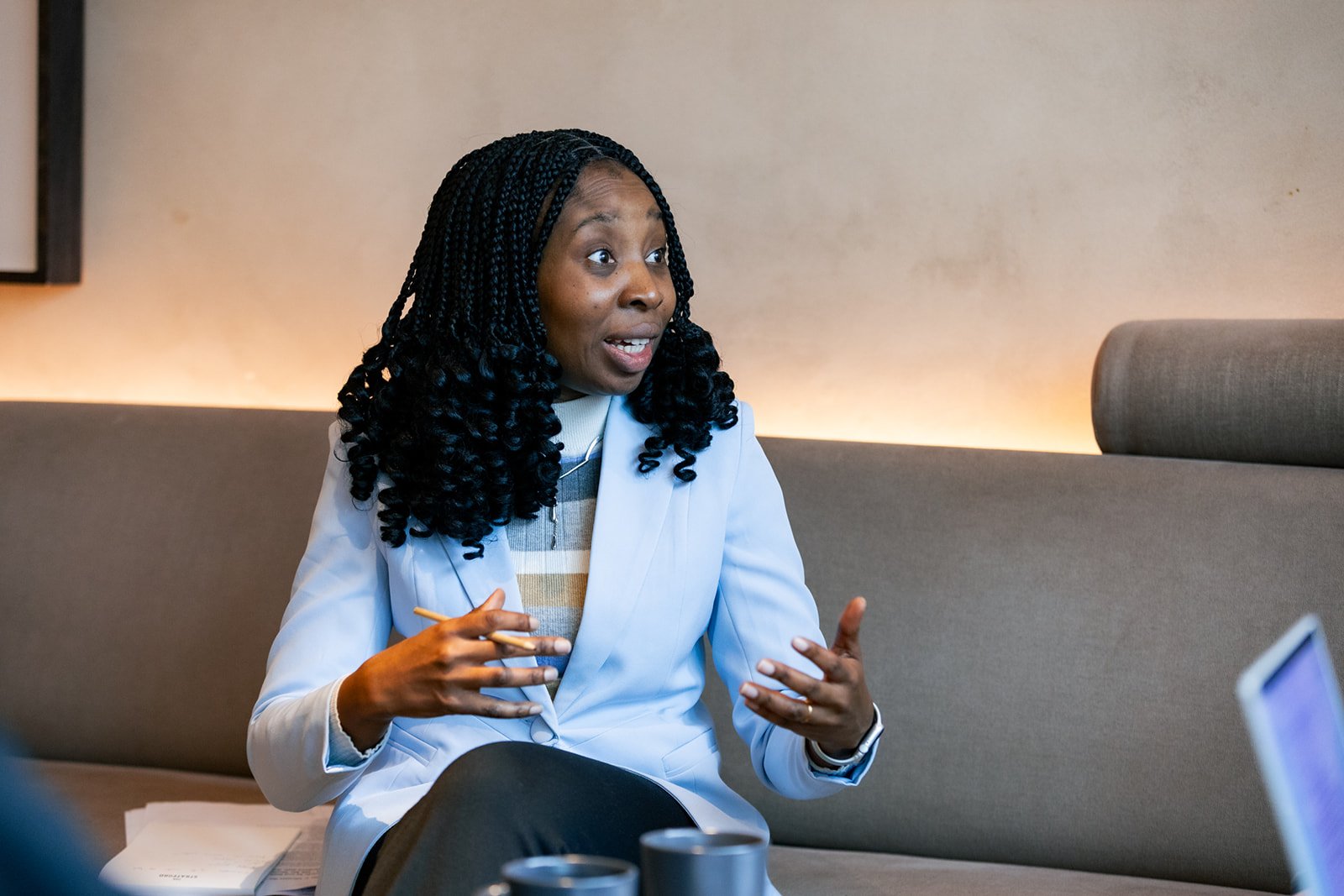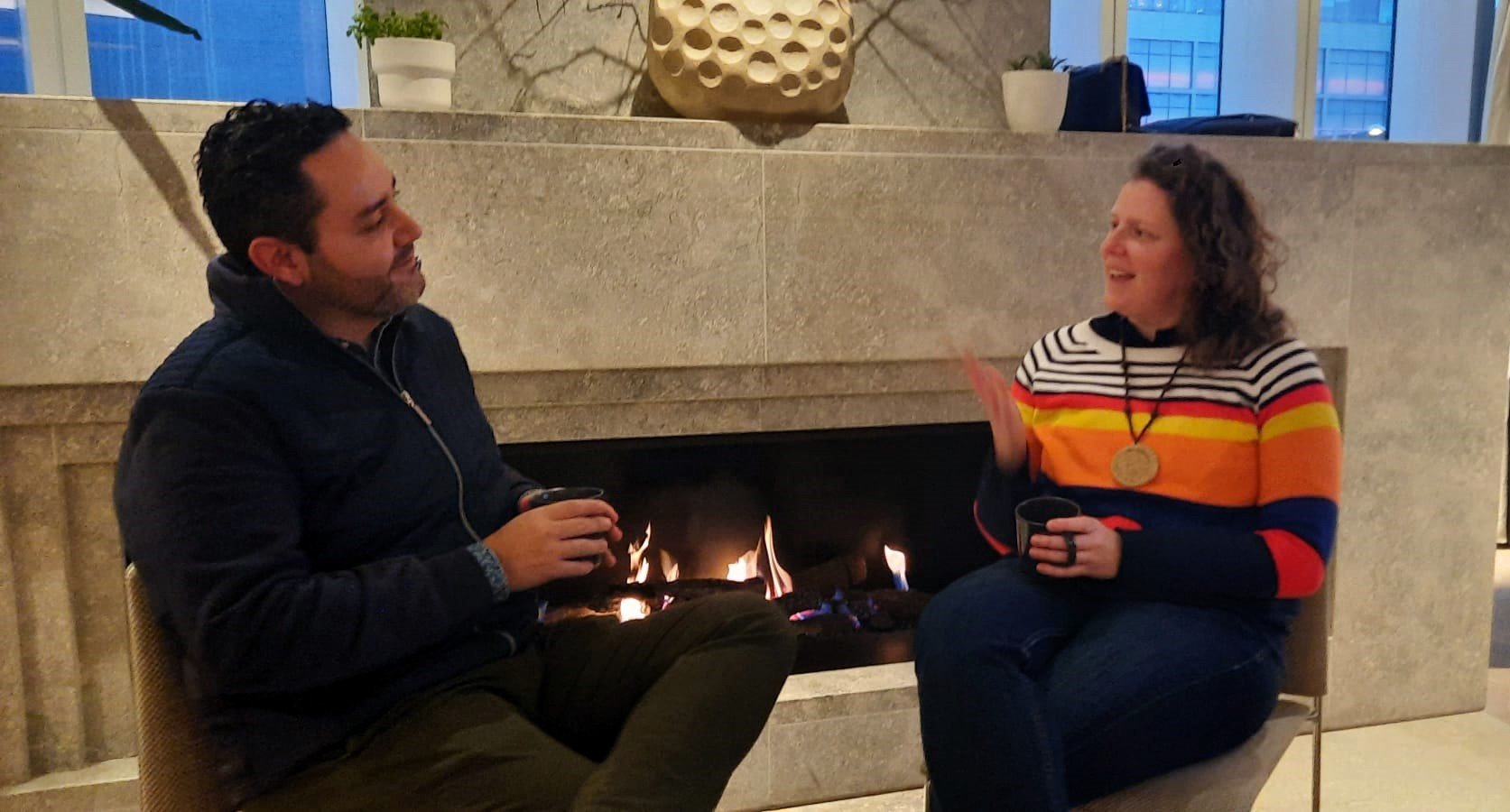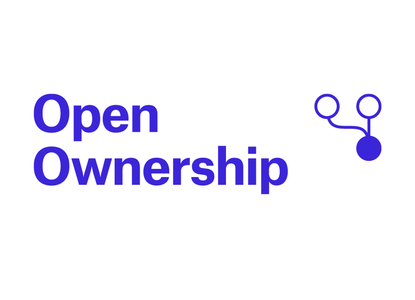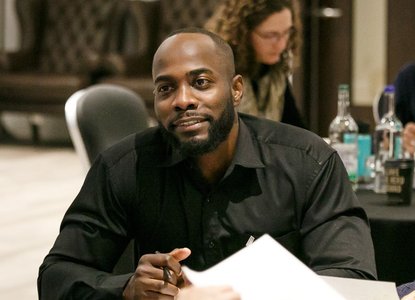Welcome to the team, Onyi and Rodrigo

Onyi Ough speaking about the importance of beneficial ownership transparency at Open Ownership’s recent whole-team retreat
We recently welcomed two new members of staff to the Open Ownership (OO) team, Onyi Ough and Rodrigo Félix Montalvo.
At our recent whole-team retreat, we got to know Onyi and Rodrigo a bit better. Learn about the paths which led them to Open Ownership in this blog post.
Onyi Ough
OO: Tell us about your early life
I am from Nigeria and grew up there. Even though I had always been frustrated by the lack of public services, I didn't know that this kind of problem could be challenged, or how.
When I first finished my National Youth Service, I had no idea what non-governmental organisations (NGOs) do. I was looking for jobs in a bank or in the private sector like everyone else. I was offered an opportunity and thought, why not? I left Lagos, went to Abuja, and that was how I started working in international development: as an intern for an anti-corruption NGO.
OO: At what point did you realise your calling to work in the anti-corruption sector?
My first job was for the Zero Corruption Coalition. I started to build skills that I'm still using now, 18 years later, and I started to understand corruption more clearly. Within two years I had had so many opportunities in that role: working with the parliament and with government officials. Family and friends questioned why I was not applying for high-paying roles in the private sector. But I knew that this was my calling; I was doing something where I was getting fulfillment and working towards a good cause. As an early-career professional I found myself in meetings discussing anti-corruption challenges. Senior, international officials were asking what I thought and listening to me, and I knew that this was the job for me.
Since then, I worked on one of the United States’ Agency for International Development (USAID)’s international programmes and then did a Masters in International Development at the School of Oriental and African Studies in London. I also worked for some UK Department for International Development anti-corruption programmes as a consultant for several years.
I realised that one key way to tackle corruption is to challenge social norms, and believing that it’s effective to start with the youngest in our society, I wrote four anti-corruption story books, starting with “Emeka’s Money”. I'm proud to say that over 60,000 children in Nigeria have read it, it got international exposure, and led to me founding an anti-corruption organisation, Step Up Nigeria.
OO: And why is anti-corruption work important to you now, particularly?
It is important to me because the problem still persists. There are structures which make it hard to create change, which is why it’s important to tackle the root causes of corruption.
OO: You’ve come into a brand new role at OO, working as the Programmes and MEL (Monitoring, Evaluation and Learning) Manager. What do you think are the challenges ahead?
I'm a programme management expert, and I saw starting at Open Ownership as a good fit with my anti-corruption career. I've worked on many topics, and beneficial ownership transparency is an evolving area about which I want to learn more. It is a good opportunity to learn about different areas of anti-corruption efforts globally; one of the things that attracted me is that OO works around the world.
This role is exciting because I am good at strategic thinking and looking at the big picture. The initial challenges are trying to get a grasp of all the technical areas that we work on, and managing the balance of not knowing everything at the start, but getting up to speed quickly. It is going well.

Rodrigo Félix Montalvo being interviewed for this blog post by Communications Associate Isabelle Kermeen, during Open Ownership’s whole-team retreat.
Rodrigo Félix Montalvo
OO: Tell us about your early life
I grew up in Sonora state, in the north of Mexico, close to the Arizona border. It's one of the areas in Mexico with the most economic development. I had a quiet and comfortable upbringing.
It was quite peaceful until the early 2000s, when the war on drugs broke out. Life changed from one day to the next. From being one of the safest places in the country, it became one of the worst. There were lots of kidnappings, as organised crime groups tried to diversify their income. After that, my life radically changed.
OO: At what point did you realise your calling to work in anti-corruption and public policy?
My father was kidnapped. It wasn't until then that I understood how corruption affects daily lives, and how corruption hinders the rule of law. That's why I started working on the rule of law, and trying to understanding the issues. My father was able to come back many months later, but in the case of many people I know, they didn't come back. I also saw how many people lost their livelihoods: my own family lost our company because we had to make ransom payments.
I gathered experience from lots of fields; I was Research Assistant at the Monterrey Institute of Technology and Higher Education, mainly on economics and trade related to the 2008 US elections and 2006 Mexican elections. I also did some work in Mexico - economic development analysis for indigenous communities affected by a hurricane in the Tabasco region. Understanding my desire to improve the status quo, I wanted to see how public policy was made and who was involved in the decision-making process. I applied to the civil service and I got to work in the office of the minister, and was involved in the negotiations for free trade agreements and also worked on reducing inequality. That is how I got into working on these topics and I love it. I worked for the Mexican government for many years as the chief advisor to three different ministers of the economy. That is where I started seeing two trends: the trend towards a digital economy, and how corruption poses a risk to economic development. Corruption was hard to track, however,because we didn't yet have the right digital data.
I was in charge of some events for the G20 in Mexico in 2012; I co-led many of the conversations on anti-corruption, and worked on technology at the B20. Eight years ago, I started to work for the UK government, supporting the rule of law, anti-corruption and digitisation for Latin America.
OO: And why is working in the anti-corruption sector important to you now, particularly?
I think OO and what we do is at the crossroads of how we can better use data to tackle organised crime, and improve the rule of law. Right now, there is a big problem internationally with money-laundering, corruption and organised crime. It’s essential to understand who is funding this, and how illicit finances are moving. That is where OO’s work comes in. I don't think that you can eradicate corruption and organised crime as a whole, but you can reduce the opportunity for it to happen.
There are opportunities for the United Nations Convention against Corruption in the coming cycles, and the reviews that are happening for the anti-corruption task force for the 2024 G20 in Brazil. So the question is: how do you move forward, and ensure that the transparency frameworks are made not only for the countries that have access to more wealth and power, but can be implemented in all countries.
OO: You’ve come into a brand new role at OO, working as the Regional Manager for the Americas. What do you think are the challenges ahead?
The main challenge is trying to understand how to generate a transformation in a region this diverse. We have some of the most developed countries in the world like the US and Canada, we have others that are part of the G20 like Argentina and Mexico, and we also have some countries which have less access to wealth and power. Addressing illicit finance and money-laundering is also key in the UK Overseas Territories (OTs), so another challenge is how to work with the OTs to ensure they comply with international agreements.
I’m excited about these challenges. OO works in five continents, so as we better understand varied national contexts, I can learn about how the push for beneficial ownership transparency in other countries and regions could be applied to the countries in the Americas.
It's interesting to have this opportunity, because I saw OO grow and develop from the outside; I attended the UK Anti-Corruption Summit in 2016, where OO began. A year later, I was collaborating with the UK’s Companies House and heard about the Open Ownership Register being built. I realised how important it would be in terms of being able to link different data sets, as there was no way to easily do that at that time. Now OO works on technical capacity-building, the Beneficial Ownership Data Standard, policy, research, theory and implementation. Current governments have a great opportunity to make more and more data interoperable internationally, which will help address and prevent corruption. I feel positive about the possibilities over the coming months and years.
Related articles and publications
Publication type
Blog post

